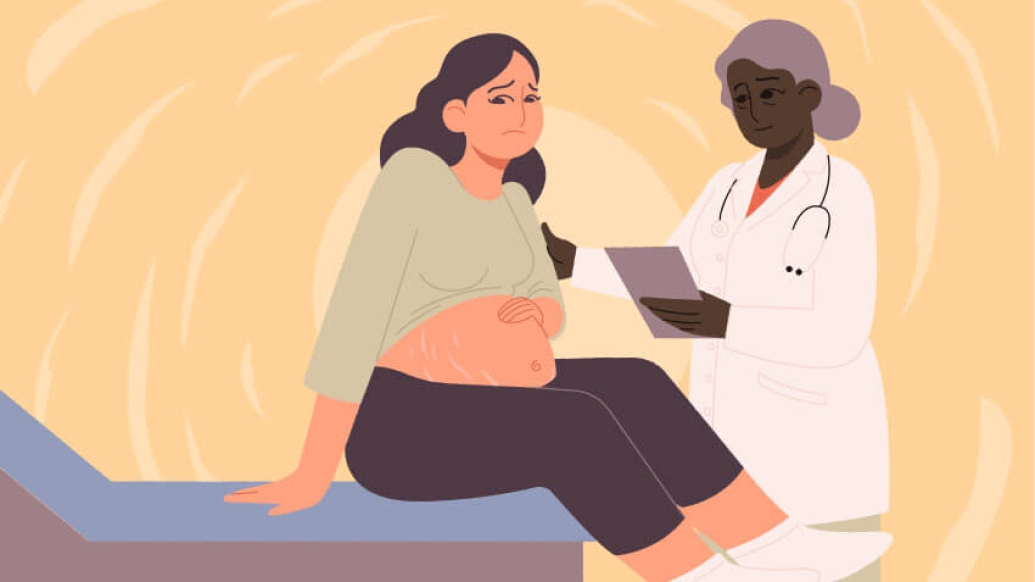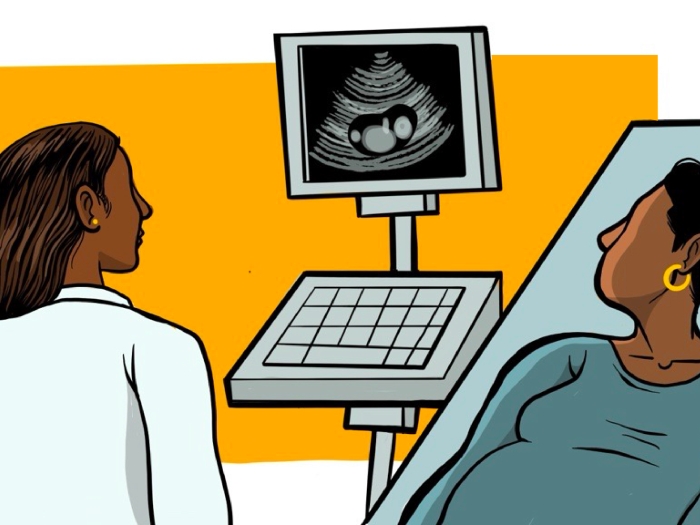Participants said the lesions caused similar or more distress than skin conditions like acne or psoriasis.
5:00 AM
Author |

While stretch marks are commonly associated with pregnancy, the permanency of the skin lesions causes pregnant women and pregnant individuals substantial embarrassment that can negatively impact pregnancy and their quality of life, according to a new study.
Researchers at Michigan Medicine surveyed more than 100 pregnant patients with stretch marks who were considering delivery at Von Voigtlander Women's hospital. Nearly 75% of the participants reported having moderately or prominently noticeable stretch marks, and more than one-third reported "a lot" or "moderate" embarrassment related to the lesions.
MORE FROM THE LAB: Subscribe to our weekly newsletter
"Women were very concerned about the permanency of lesions, which are often met with negative feelings and self-consciousness," said Frank Wang, M.D., senior author of the paper and William B. Taylor Endowed Professor of Clinical Dermatology at Michigan Medicine. "The women who reported feeling embarrassed were also more likely to report the lesions impacting other parts of their lives like social activities, self-esteem and clothing choice."
Wang started studying striae gravidarum, or stretch marks of pregnancy, around 15 years ago. He and his team have searched for the molecular mechanisms that cause the lesions, finding they display substantial changes in collagen and elastic fibers, components of the skin that are responsible for strength and elasticity.
SEE ALSO: New prenatal care guidelines emerge from COVID
For reasons his team is still investigating, these skin components are damaged and never fully reform, leading to permanent lesions. This unsolved problem was a chief concern reported by 75% of the pregnant women surveyed for the paper published in the International Journal of Women's Dermatology.
"While there are some ways to reduce intense redness or texture of stretch marks, there is very little scientific evidence that any intervention completely prevents or treats lesions," Wang said. "None of these interventions fully erase stretch marks, and they can get very expensive."
Stretch marks and the concerns for developing them may be contributing factors for depression or anxiety in the perinatal period, which affect up to one in seven women during pregnancy and postpartum, says Megan Lawlor, M.D., a co-author of the paper and assistant professor of obstetrics and gynecology in the Division of Maternal Fetal Medicine at Washington University in St. Louis.
If uncontrolled or untreated, perinatal depression can lead to adverse pregnancy or neonatal outcomes," Lawlor said. "Bringing attention to the emotional and psychological impacts of stretch marks on patients can hopefully help in the identification and treatment of mental health disorders during pregnancy and in the postpartum period."
For years, stretch marks have been a topic to avoid and something many women try to hide, says Timothy Johnson, M.D., co-author of the paper and Arthur F. Thurnau Professor of Obstetrics and Gynecology at Michigan Medicine.
"Pregnant women talk about stretch marks with me every single week at clinic, and it's time we break the stigma and start talking about them openly with all patients," Johnson said. "Many of the women said the stretch marks caused similar or more emotional distress than other skin problems, such as acne, eczema and psoriasis. By doing this study, we have an opportunity to normalize stretch marks in the context of all other dermatological conditions."
By doing this study, we have an opportunity to normalize stretch marks in the context of all other dermatological conditions.Timothy Robert B. Johnson, MD
Wang continues to study stretch marks at the molecular level and is currently enrolling participants in a study that examines the formation of the earliest stretch marks. The study involves skin biopsies taken as soon as they form during pregnancy. Wang said the current paper on the emotional impact of stretch marks is evidence that his continuing research is vital to many patients and will further motivate his team to find answers.
SEE ALSO: A Mission to Solve the Mystery of Stretch Marks
"This is an issue that a lot of pregnant individuals care deeply about and should show future research sponsors that it's worth investing resources," he said. "Our hope is that by enrolling enough participants, we can generate precision data that will translate into rational therapies that will prevent or effectively treat stretch marks."
Meanwhile, physicians need to be diligent in asking parents about their individual physical and psychological struggles when assessing their wellbeing, as parents are less likely to spontaneously bring up concerns that are associated with feelings of shame or embarrassment, says Samantha Shaw, M.D., clinical instructor and perinatal psychiatrist at Michigan Medicine.
"In our diagnosis and treatment, we tend to focus a lot on the challenges they face in caring for and bonding with the infant," Shaw said. "We need to be supporting and asking gestational parents about the journey their body has been taken on through the process of pregnancy, labor and delivery, so that we do not miss important pieces of the story and important targets of their treatment."
Like Podcasts? Add the Michigan Medicine News Break on iTunes or anywhere you listen to podcasts.
This study was internally funded by the Michigan Medicine Department of Dermatology and the Department of Obstetrics and Gynecology. Here you can see how to enroll in Wang's current study on the formation of stretch marks. For questions, reach out to [email protected].
Paper cited: "Negative perceptions and emotional impact of striae gravidarum among pregnant women," International Journal of Women's Dermatology. DOI: 10.1016/j.ijwd.2021.10.015

Explore a variety of healthcare news & stories by visiting the Health Lab home page for more articles.

Department of Communication at Michigan Medicine
Want top health & research news weekly? Sign up for Health Lab’s newsletters today!





